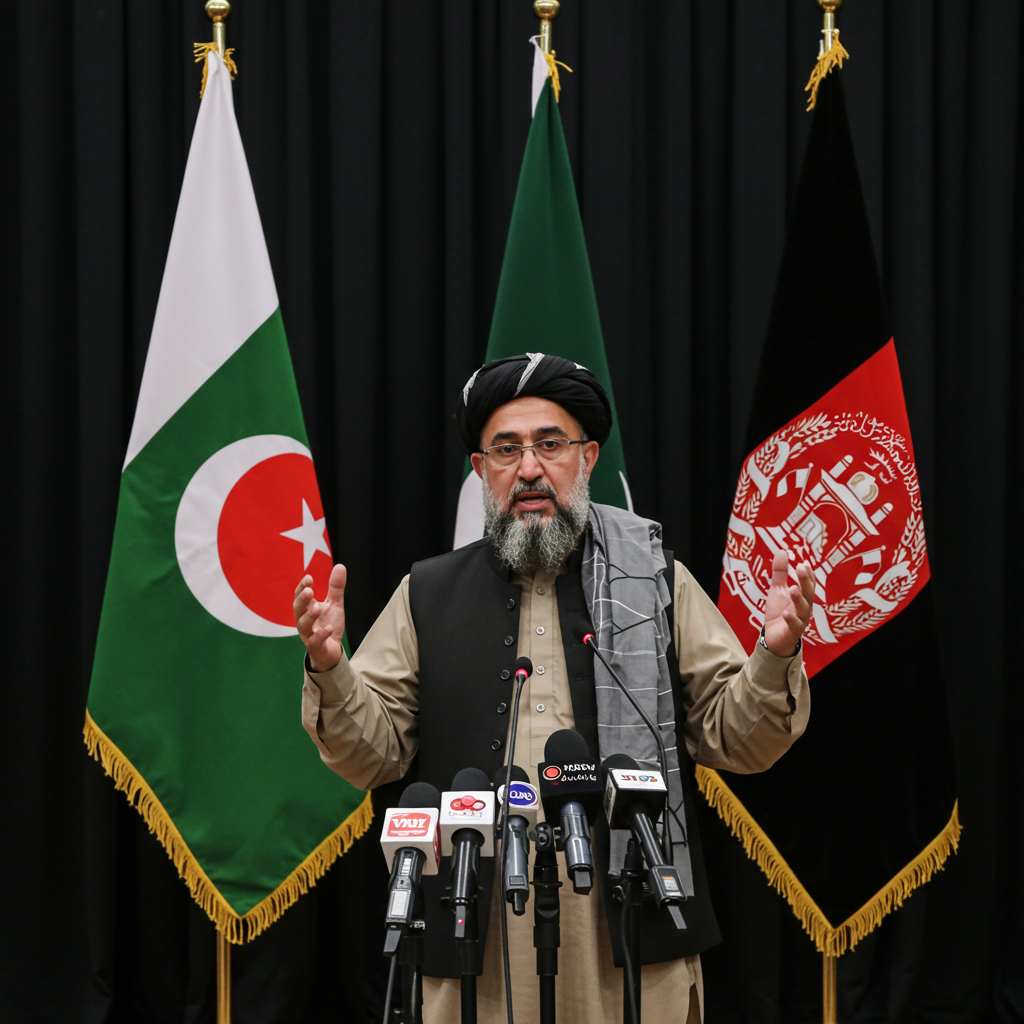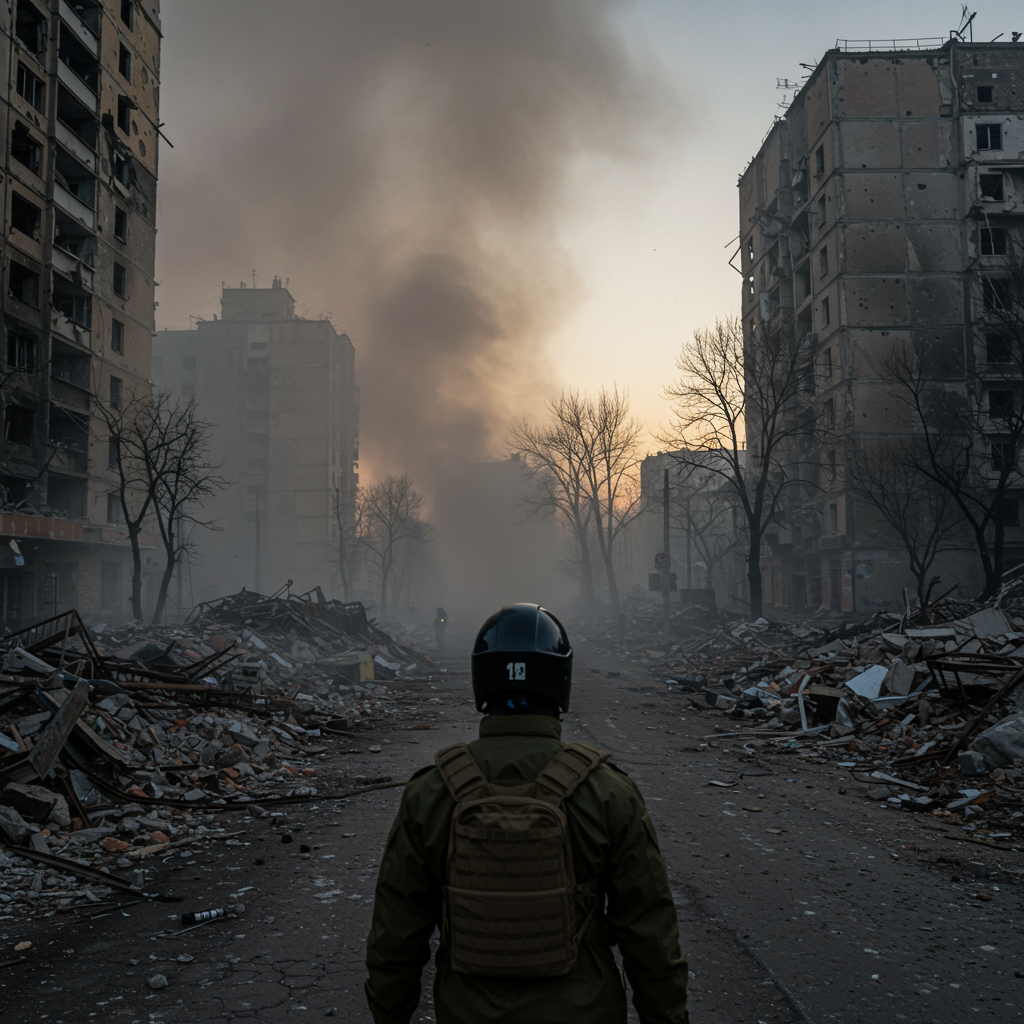Tensions between Afghanistan and Pakistan have dramatically surged following recent accusations from the Taliban government, which explicitly blames its neighbor for a series of bombing strikes in the Afghan capital, Kabul, and the eastern province of Paktika. This grave accusation, made on a Friday in October 2025, marks a significant escalation, with Afghanistan’s Defense Ministry denouncing the actions as egregious violations of national airspace. The deepening mistrust between the two nations is complicated by ongoing cross-border hostilities and the critical issue of militant groups operating along their shared frontier.
A City Under Threat: Blasts Rock Kabul
The immediate catalyst for this diplomatic crisis was a blast that struck before 10 p.m. local time on a Thursday in Kabul’s Abdul Haq Square area. This sensitive location is notably close to several vital government ministries and Afghanistan’s national intelligence agency. Security forces swiftly sealed off the area, prompting immediate investigations. Initially, the Taliban’s chief spokesman, Zabihullah Mujahid, downplayed the incident. He described the explosion as an accident, confirming no reports of injuries or significant damage at the time. However, this narrative quickly shifted.
On Friday, Afghanistan’s Defense Ministry issued a starkly different statement. It directly attributed responsibility for the Kabul attack, along with another incident in the eastern province of Paktika, to Pakistan. Despite these severe allegations, the Afghan Defense Ministry did not elaborate on the specific source of the bombing or how Pakistan purportedly executed strikes in urban centers without detection or interception. The ministry condemned these “unprecedented, violent and heinous” strikes, issuing a stern warning of consequences should the situation deteriorate further.
Pakistan’s Veiled Response and Firm Warnings
Pakistan’s reaction to these accusations was indirect but assertive. When questioned by reporters on Friday about whether its military had conducted attacks in Afghanistan to target leaders of the banned Tehrik-i-Taliban Pakistan (TTP), Pakistani Army spokesman Ahmad Sharif offered no direct confirmation or denial. Instead, speaking in Peshawar, he unequivocally stated, “Afghanistan is being used as a base of operations against Pakistan, and there is proof and evidence of that.” Sharif affirmed Pakistan’s commitment to “necessary measures” to protect the lives and property of its citizens, indicating that such actions would continue.
This exchange unfolded against a backdrop of intensifying violence within Pakistan, largely claimed by the TTP. This group, distinct from but allied with the Afghan Taliban, is widely believed to operate from sanctuaries across the Afghan border—a claim consistently denied by the Afghan Taliban authorities. Pakistan has a documented history of launching strikes inside Afghan territory, targeting what it claims are militant hideouts and installations. This latest incident, if confirmed as a Pakistani strike, would represent the first such attack in the Afghan capital since a 2022 U.S. drone strike killed al-Qaida leader Ayman al-Zawahiri.
The TTP Nexus: Fueling Cross-Border Tensions
At the heart of the escalating Afghanistan-Pakistan conflict lies the Tehrik-i-Taliban Pakistan (TTP). Formed in 2007, this group emerged in response to Pakistan’s military operations supporting the U.S. invasion of Afghanistan. Since then, the TTP has waged a deadly insurgency, intensifying its campaign of violence against Pakistani security forces in recent months, particularly in the northwestern Khyber Pakhtunkhwa province. August 2025 marked Pakistan’s deadliest month for militant violence in over a decade, with 194 fatalities reported by the Pakistan Institute for Conflict and Security Studies.
Pakistan has consistently accused the Afghan Taliban of providing safe havens for TTP militants, who then launch cross-border attacks into Pakistan. An earlier United Nations report supports this, stating that the TTP “received substantial logistical and operational support from the de facto authorities” in Kabul. Conversely, the Afghan Taliban maintains its policy of not allowing its territory to be used against other countries and denies harboring TTP fighters. This fundamental disagreement forms a “major sticking point,” deepening animosities between the two nations and posing “worrying long-term consequences,” according to Islamabad-based expert Imtiaz Gul.
Escalating Border Skirmishes and Diplomatic Fallout
The volatile situation quickly deteriorated into direct military confrontation. Following the alleged Pakistani air strikes, Afghan Taliban forces launched retaliatory attacks on Pakistani border posts, with the Afghan military confirming “successful” operations. Pakistan, in turn, characterized these as “unprovoked firing” from Afghanistan, stating its forces responded “with full force” using heavy fire and artillery at more than six locations. Conflicting reports emerged regarding casualties, with Pakistan’s military claiming over 200 Afghan fighters killed and 23 of its own soldiers deceased. The Afghan Taliban, however, stated nine of its soldiers were killed while claiming 58 Pakistani soldiers dead and the capture of significant Pakistani weapons. Pakistan subsequently closed its border with Afghanistan.
The timing of these alleged strikes and the subsequent escalation is particularly noteworthy. They coincided with the Taliban’s first diplomatic trip to India since their return to power in 2021. Pearl Pandya, a senior analyst with the Armed Conflict Location & Event Data Project (ACLED), noted that Pakistan has increased its use of airstrikes within Afghan territory this year, largely targeting alleged TTP hideouts. Pandya suggested that “an improvement in relations between India and Afghanistan is likely to be resented by Islamabad, fearful of any potential destabilizing impact on its western borders.” Pakistan further accused India of being “the biggest sponsor of terrorism in the region,” a charge New Delhi denies.
Expert Perspectives on a Volatile Situation
Security analysts offer critical insights into the complex dynamics at play. Tameem Bahiss, a Kabul-based security analyst, highlighted that formal acknowledgment of Pakistani strikes in Kabul would undoubtedly inflame tensions, given the Afghan Taliban’s denials of harboring TTP fighters. He noted that past Pakistani airstrikes within Afghanistan have failed to yield concrete results, instead deepening mistrust and hindering cooperation against the TTP. Such actions, Bahiss warned, risk fostering greater Afghan sympathy for the TTP, potentially leading to new recruits and funding, even from within certain segments of the Afghan Taliban, and could provoke the TTP to escalate attacks within Pakistan.
Ihsanullah Tipu Mehsud, an Islamabad-based security analyst, suggested that if Pakistan was indeed involved, the explosions could serve as a warning following recent attacks on Pakistani soil. Mehsud indicated that Pakistan might target high-value individuals in strategic locations like Kabul (the political capital) or Kandahar (the spiritual capital) if the security situation in Pakistan remains dire and the Afghan Taliban continue to fail in controlling the TTP. This deepening mistrust and the potential for direct cross-border strikes signal an increasingly volatile and complicated regional dynamic, especially as the Afghan Taliban seeks wider international diplomatic recognition.
Pakistan’s Unwavering Resolve
Pakistan’s resolve against militants operating from Afghan soil appears to be hardening. Defence Minister Khawaja Asif issued a stern warning to Kabul, declaring, “enough is enough” regarding continued assaults on Pakistani forces. He informed the nation’s parliament that multiple efforts to convince the Afghan Taliban to cease backing the TTP had failed, vowing a united response against those facilitating the TTP, regardless of their location. This stance reflects immense frustration, especially given Pakistan’s decades-long hospitality to millions of Afghan refugees, which Islamabad argues has come at a significant cost. Since November 2023, Islamabad has initiated a mass expulsion campaign, forcibly repatriating nearly a million Afghans, further straining bilateral relations. Regional and international actors, including Iran, Qatar, and Saudi Arabia, have urged restraint, emphasizing the importance of dialogue and de-escalation for regional stability amidst these rising tensions.
Frequently Asked Questions
What triggered the recent escalation of conflict between Afghanistan and Pakistan?
The immediate trigger for the heightened conflict was a series of explosions in Kabul and the eastern province of Paktika on a Thursday in October 2025. The Afghan Taliban government swiftly blamed Pakistan for these strikes, labeling them as violations of Afghan national airspace. This accusation was then followed by significant cross-border military engagements and strong warnings from both sides, particularly concerning Pakistan’s long-standing grievances about the Tehrik-i-Taliban Pakistan (TTP) operating from Afghan territory.
Who are the key groups and entities involved in the current Afghanistan-Pakistan dispute?
The primary entities involved are the Afghan Taliban government and Pakistan’s military and government. A central player in the dispute is the Tehrik-i-Taliban Pakistan (TTP), a militant group responsible for a surge in violence within Pakistan, which Islamabad accuses the Afghan Taliban of harboring. Other key groups include monitoring organizations like the Armed Conflict Location & Event Data Project (ACLED), which provides analytical context to the situation. Regional and international actors, including India, Iran, Qatar, and Saudi Arabia, are also involved through diplomatic channels or geopolitical considerations.
What are the broader geopolitical implications of the escalating Afghanistan-Pakistan tensions?
The escalating tensions carry significant geopolitical implications for regional stability. Analysts suggest that continued cross-border strikes could deepen mistrust, hinder cooperation against terrorism, and potentially lead to greater sympathy and recruitment for the TTP within Afghanistan. The timing of these events, coinciding with the Afghan Taliban’s diplomatic push towards India, also highlights regional rivalries, with Pakistan expressing resentment over improved India-Afghanistan relations. The conflict threatens to destabilize an already fragile region, potentially inviting broader international intervention or exacerbating existing security challenges.
Conclusion
The recent accusations of Pakistani strikes in Kabul and Paktika, coupled with intense cross-border hostilities, signify a dangerous new phase in the already fraught relationship between Afghanistan and Pakistan. At its core, the conflict is fueled by Pakistan’s consistent demand for the Afghan Taliban to curb the Tehrik-i-Taliban Pakistan (TTP), a group that Islamabad says uses Afghan soil to launch attacks. The Afghan Taliban, while denying these claims, faces mounting pressure. As diplomatic efforts falter and military responses escalate, the region braces for potential further destabilization. The international community continues to call for restraint and dialogue, emphasizing that a peaceful resolution is paramount for the security and stability of South Asia.



